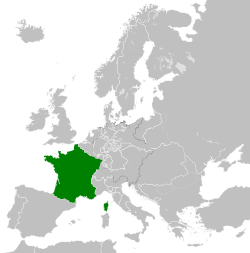
Back Julimonarchie ALS ملكية يوليو Arabic Monarquía de Xunetu AST İyul monarxiyası Azerbaijani تموز مونارشیسی AZB Ліпеньская манархія Byelorussian Юлска монархия Bulgarian জুলাই রাজতন্ত্র Bengali/Bangla Monarkiezh Gouere Breton Monarquia de Juliol Catalan
This article needs additional citations for verification. (July 2023) |
Kingdom of France[a] Royaume de France (French) | |||||||||
|---|---|---|---|---|---|---|---|---|---|
| 1830–1848 | |||||||||
| Motto: Ordre et liberté (French)[1] "Order and Liberty" | |||||||||
| Anthem: La Parisienne ("The Parisian") | |||||||||
 The Kingdom of France in 1839 | |||||||||
| Capital | Paris | ||||||||
| Religion | |||||||||
| Demonym(s) | French | ||||||||
| Government | Unitary parliamentary constitutional monarchy | ||||||||
| King | |||||||||
• 1830–1848 | Louis Philippe I | ||||||||
• 1848 | Louis Philippe II (disputed) | ||||||||
| President of the Council of Ministers | |||||||||
• 1830 (first) | Jacques Laffitte | ||||||||
• 1848 (last) | François Guizot | ||||||||
| Legislature | Parliament | ||||||||
| Chamber of Peers | |||||||||
| Chamber of Deputies | |||||||||
| History | |||||||||
| 26 July 1830 | |||||||||
| 7 August 1830 | |||||||||
| 23 February 1848 | |||||||||
| Currency | French franc | ||||||||
| |||||||||
| Today part of | France Algeria | ||||||||
| History of France |
|---|
 |
| Timeline |
| Topics |
|
|
The July Monarchy (French: Monarchie de Juillet), officially the Kingdom of France (French: Royaume de France), was a liberal constitutional monarchy in France under Louis Philippe I, starting on 26 July 1830, with the July Revolution of 1830, and ending 23 February 1848, with the Revolution of 1848. It marks the end of the Bourbon Restoration (1814–1830). It began with the overthrow of the conservative government of Charles X, the last king of the main line House of Bourbon.
Louis Philippe, a member of the more liberal Orléans branch of the House of Bourbon, proclaimed himself as Roi des Français ("King of the French") rather than "King of France", emphasizing the popular origins of his reign. The king promised to follow the juste milieu, or the middle-of-the-road, avoiding the extremes of both the conservative supporters of Charles X and radicals on the left.
The July Monarchy was dominated by wealthy bourgeoisie and numerous former Napoleonic officials. It followed conservative policies, especially under the influence of François Guizot. The king promoted friendship with the United Kingdom and sponsored colonial expansion, notably the French conquest of Algeria. By 1848, a year in which many European states had a revolution, the king's popularity had collapsed, and he abdicated.
Cite error: There are <ref group=lower-alpha> tags or {{efn}} templates on this page, but the references will not show without a {{reflist|group=lower-alpha}} template or {{notelist}} template (see the help page).
- ^ "National Motto of France". French Moments. 7 May 2015.

